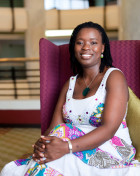I live and work in Harare. More specifically, I am a senior lecturer in law, and Deputy Director of the Southern and Eastern African Regional Centre for Women’s Law. (SEARCWL), a graduate feminist institution, focusing on women and the law, and housed in the Faculty of Law, at the University of Zimbabwe. I teach Theories and Perspectives in Women’s Law and also Women Law Reform and Social Justice Strategies at Masters level. I also teach Women’s Law to undergraduate law students. Research and research supervision up to PhD level, drawing on women’s lived realities, are also core elements of my work.
Given that feminism is about striving for, and defending women’s rights at all levels of society I don’t see feminism as something that you merely call yourself but rather as something that you do and also something that you live by. My life and my work are centred on a quest for social justice for women in particular and black people in general, through a combination of academia, research and activism. My quest is to ensure that feminist standpoints, in their multiple manifestations, are an integral part of the dialogue that shapes our understanding of law and reality in our context. Equally important to me is ensuring that women’s voices and experiences inform our standing of law and what it is that needs to be changed.
Few take African feminists seriously. Ensuring that our discourses permeate all critical levels that shape the continent’s reality is in my view one of the greatest challenges facing feminists in Africa today. It is vital that we do not remain talking amongst ourselves as feminists but that we also mainstream our ideas and visions for the continent into the critical areas that influence our existence, be they the academy, the market or the political sphere. It is about knowing where best each of us can make a difference, and to contribute by playing our part in that selected arena on feminist terms.
As African feminists, we need to harness more effectively our continent’s history of struggle from domination in order to bring home the point that women’s struggles, especially against patriarchal and sexual domination, are key aspects of that struggle. Also, strengthening our articulation and involvement with the political and development discourse on the continent, will help to link feminism to the day-to-day realities of many women in Africa. Finally, we need to strengthen our ‘doing’: we need to be more action oriented in every sphere, in the sense of providing living testimonies of those changes that we so desperately want to see. My contribution to mainstreaming feminist realities in the academic realm has been through ensuring the production of a breed of lawyers who have a feminist view of the law and of the world and who have the confidence to stand up for what they believe in, internally and externally. I give freedom to my soul, first and foremost when it comes to my personal life, as I see this as critical if we feminists are to move the agenda of acceptance a step further throughout each generation.
In word, thought and deed, blackness and being an African woman in particular, is most certainly what truly inspires me. I do not permit others to trample on me just because I am black or because I am a woman. This is why I find both these states of ‘being’ truly inspirational as they have helped me to contribute to getting humanity to hold itself to higher values.



